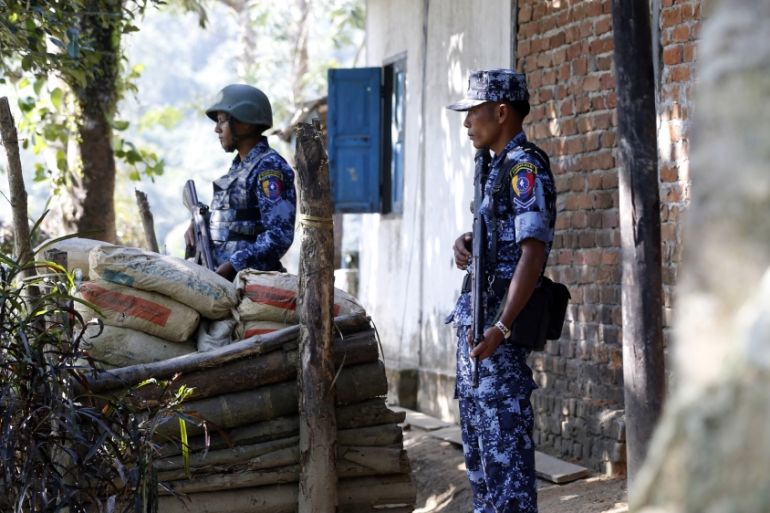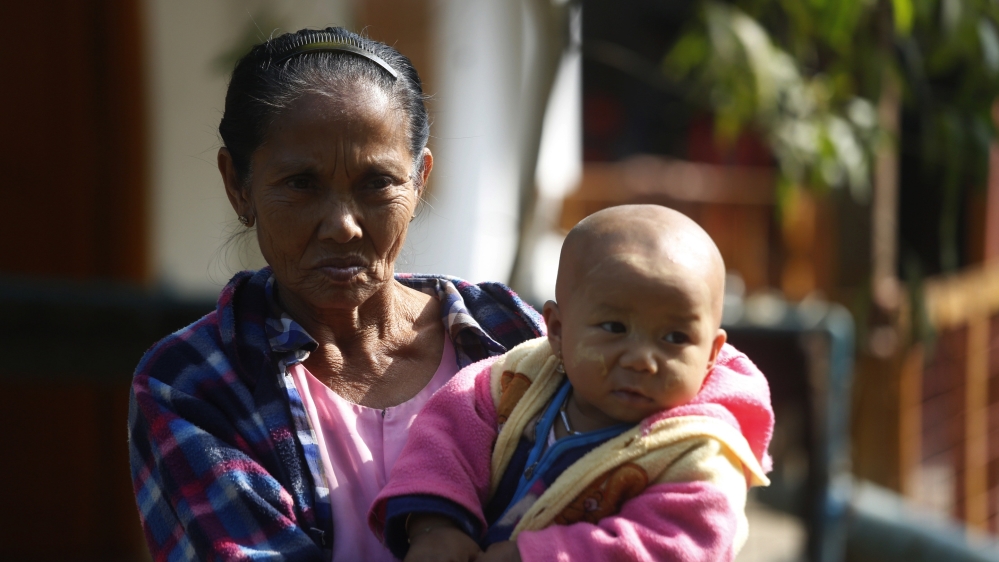Fighting in Rakhine, Chin states rages as Myanmar limits internet
Activists and journalists say decision to limit internet access in some parts of Rakhine is a violation of basic rights.

Yangon, Myanmar – Continued fighting between Myanmar’s military and the Arakan Army armed group has left several people dead in recent days as the government continues a clampdown on the western region.
Activists and journalists have decried the internet blackout the government has imposed as part of the clampdown as a violation of human rights.
Keep reading
list of 3 itemsAt least 19 children injured in Myanmar school shelling
Facing Myanmar return, Chin watch unrest with alarm
Reports on Tuesday said at least 11 civilians, including five Muslim Rohingya, had been killed after being caught in the hostilities in Rakhine, a western state that is home to more than three million people.
In a statement, four United Nations human rights experts also said “credible reports” showed that more than 1,000 people had been displaced in the 10 days up to February 18. The Myanmar Times also quoted the Rakhine Ethnic Congress as saying that more than 120,000 have evacuated beginning in November 2018.
Since 2019, government forces have been embroiled in a new conflict with the Arakan Army, an armed rebel group that wants more autonomy for the ethnic Rakhine people.
In 2017, a conflict between the military – also known as the Tatmadaw – and another rebel group, the Arakan Rohingya Salvation Army, led to the exodus of at least 740,000 Rohingya to neighbouring Bangladesh, drawing allegations of genocide.
|
|
Now, residents of Rakhine, as well as more than 125,000 Rohingya still in refugee camps, are caught in the new wave of conflict.
As part of the government’s response to the violence, it shut down the internet in early February in four townships in Rakhine and one town in neighbouring Chin state. The five towns impacted had been under temporary blackouts from June to August 2019, and join four other townships that have remained under a blackout since June 2019.
The decision to cut off the internet was revealed last month after Telenor, a Norway-based telecommunications group, announced that its Myanmar affiliate had been instructed to temporarily stop mobile internet services to these towns.
Isolation from the world
People protesting against the shutdown have been targeted, according to activists and rights groups.
In Myanmar’s largest city of Yangon, five people were arrested on February 24, and four others are facing charges for violating Myanmar’s much-criticised law on peaceful procession.
Min Ba Chay, a young activist who helped organise the protests in Rakhine, said the internet blackout is so harmful to civilians it could be seen as life-threatening.

“For young people, the shutdown is like isolating them from the rest of the world,” he said, adding that he doubted the government justification of the internet shutdown being necessary for national security.
“Daw Aung San Suu Kyi herself encouraged young people to get involved in politics. But now her government arrested students,” he said, referring to the country’s leader.
According to Min Ba Chay, without internet connectivity, Rakhine’s civilians find it harder to access aid from humanitarian organisations, exchange information on which areas to avoid when fighting breaks out, and to contact family members outside the state.
‘End world’s longest internet shutdown’
Ei Myat Noe Khin, a digital rights activist, told Al Jazeera: “There should be no internet shutdown anywhere in the world, especially in conflict areas such as Rakhine.”
It is also “outrageous” that student activists are facing charges after demanding justice and human rights, she said, urging the government to drop the cases immediately.
Ei Myat Noe Khin and organisers of the Myanmar Digital Rights Forum, are calling for an end to what they call “the world’s longest internet shutdown”.

The blackout in parts of Rakhine also affects the work of journalists covering the conflict, putting them at increased risk, a senior Myanmar journalist said.
Aung Marm Oo, chief editor for the Rakhine-based Development Media Group (DMG), said his reporters could not contact sources, obtain video footage, or independently verify stories on the ground.
“Our reporters have to spend a lot of time and money to go to the affected areas, putting their lives in more danger,” he said.
Journalist in hiding
Aung Marm Oo, who has been in hiding for more than 10 months, says the military has a “hidden agenda” in shutting down the internet.
“They want to wipe out the Arakan insurgency groups,” he said.
Aung Marm Oo fled into hiding after being charged under the Unlawful Association Act, which prohibits supporting an illegal organisation, like the Arakan Army.
The government has determined that activities such as disseminating news about the Arakan Army or sharing their statements qualify as unlawful association.
|
|
Spokespersons for Myanmar’s government and the military did not respond to Al Jazeera’s request for comment.
In an earlier statement, Major General Soe Naing Oo of Myanmar’s military information committee said the shutdown would go on as long as the unrest continues, referring to an incident where a soldier had been stabbed to death.
He also accused locals of siding with rebel group against the military, blaming telecom networks as the source they were “getting information from”.
At a separate press conference, Zaw Htay, spokesman for the President’s Office said the government would “fulfil every request made by the Tatmadaw” and claimed other countries had “similar practices” when it came to restricting access to the internet.